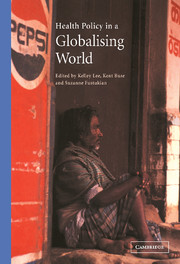Book contents
- Frontmatter
- Contents
- List of figures
- List of tables
- List of boxes
- Notes on contributors
- Foreword
- Preface
- Acknowledgements
- Abbreviations
- Part I
- 1 An introduction to global health policy
- 2 The public health implications of multilateral trade agreements
- 3 Globalisation and multilateral public–private health partnerships: issues for health policy
- 4 Global approaches to private sector provision: where is the evidence?
- 5 Regulation in the context of global health markets
- 6 Global policy networks: the propagation of health care financing reform since the 1980s
- 7 The globalisation of health sector reform policies: is ‘lesson drawing’ part of the process?
- 8 Cost-effectiveness analysis and priority-setting: global approach without local meaning?
- Part II
- Part III
- References
- Index
- References
8 - Cost-effectiveness analysis and priority-setting: global approach without local meaning?
Published online by Cambridge University Press: 22 September 2009
- Frontmatter
- Contents
- List of figures
- List of tables
- List of boxes
- Notes on contributors
- Foreword
- Preface
- Acknowledgements
- Abbreviations
- Part I
- 1 An introduction to global health policy
- 2 The public health implications of multilateral trade agreements
- 3 Globalisation and multilateral public–private health partnerships: issues for health policy
- 4 Global approaches to private sector provision: where is the evidence?
- 5 Regulation in the context of global health markets
- 6 Global policy networks: the propagation of health care financing reform since the 1980s
- 7 The globalisation of health sector reform policies: is ‘lesson drawing’ part of the process?
- 8 Cost-effectiveness analysis and priority-setting: global approach without local meaning?
- Part II
- Part III
- References
- Index
- References
Summary
The culture of international public health discourse and infectio The culture of international public health discourse and infectious disease can be characterised in part by the reigning logic of cost-effectiveness.
Henry and Farmer (1999)Introduction
In recent years there has been a greater focus on the process of priority-setting between competing uses of resources, as many countries face increasing resource constraints in the health sector. For some countries, health care costs have risen rapidly due to the adoption of new and expensive technologies, and ageing populations. For others, fiscal constraints have arisen through a combination of weak economic performance, decreasing public health expenditures, and limited amounts of donor resources going to the health sector. The responses to the scarcity of resources have been varied, but all are encapsulated within a ‘global culture of reform’ (Yach and Bettcher 1998a)
Health sector reforms of public health service provision have been widely promoted, affecting the organisation, funding and management of health systems (Zwi and Mills 1995). Important components of health sector reform include ‘defining priorities, refining policies and reforming the institutions through which those policies are implemented’ (Cassels 1995). Limited health care budgets have emphasised the need for providers to use available resources more efficiently. Hence there has been a greater emphasis on explicit priority-setting to determine how resources are allocated between health interventions, as well as a call for improved accountability and transparency of decisions, which is part of both the national and international policy agenda.
Information
- Type
- Chapter
- Information
- Health Policy in a Globalising World , pp. 140 - 156Publisher: Cambridge University PressPrint publication year: 2002
References
Accessibility standard: Unknown
Why this information is here
This section outlines the accessibility features of this content - including support for screen readers, full keyboard navigation and high-contrast display options. This may not be relevant for you.Accessibility Information
- 3
- Cited by
